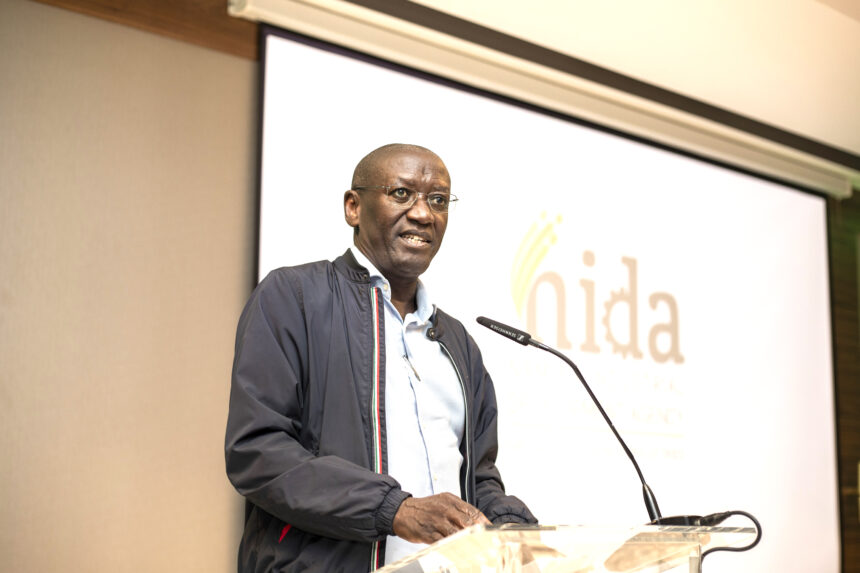In continuous efforts to uphold its mandate of emancipating the economy, the Namibia Industrial Development Agency (NIDA) engaged stakeholders from various financial organisations in Windhoek on 25 April.
The event brought together various key stakeholders from institutions such as banks and financial organisations in Namibia and South Africa.
It further served as a platform to present NIDA’s newly-developed Sustainable Business Model and Integrated Strategic Business Plan, while simultaneously highlighting the new investment opportunities that exist for possible partnerships.
NIDA has a critical role to play in Namibia’s economic transformation by facilitating investment, supporting agribusiness and spearheading industrial initiatives. Along with the development of its first Integrated Strategic Business Plan (ISBP), NIDA has vigorously pursued its mandate to advance Namibia’s industrialisation agenda by enhancing, promoting, facilitating and managing domestic industrial development.
The ISBP has been described as a defining moment for NIDA, as it lays out the agency’s trajectory over the next five years. The ISBP is intended to guide NIDA’s efforts in strengthening its institutional capacity, enhancing operational efficiency and driving industrialisation that forms part of the last stretch to assist the government in achieving Vision 2030.
In his opening remarks, chairperson of the NIDA board Sebulon Kankodi highlighted the agency’s role since its inception.
“Since its establishment in 2018, NIDA has not assumed its rightful position at the forefront of industrial development, where it will play a key role in advancing Namibia’s economic transformation. As part of the newly-developed strategy our journey will be one of growth, adaptation, and strategic repositioning, ensuring that we remain an effective vehicle for industrial progress.
As you are aware, NIDA was created by the merger of the former Namibia Development Corporation (NDC) and the former Offshore Development Company (ODC). Wholly-owned by the Government of the Republic of Namibia, NIDA is a commercial public enterprise with a commercial mandate. As part of the board’s efforts to ensure NIDA plays a pivotal role in fulfilling its mandate as a commercial public enterprise and more so our industrialisation mandate, the board’s focus for 2024 was the laying of a strong governance foundation, and the setting up of the strategic direction of the organisation”.
He added: “In order to place NIDA in the driver’s seat of the industrialisation agenda, collaboration and partnership is of paramount importance.
And we believe financial institutions are well-positioned and have the capacity to walk the journey with NIDA.”
Meanwhile, Richwel Lukonga, NIDA’s chief executive officer, presented the agency’s strategic focus and investment opportunities, highlighting three industrial infrastructure opportunities.
“Prime industrial land for investment and development in Walvis Bay, Windhoek and Okahandja is available. The Special Economic Zones are there to promote local investment and attract foreign direct investment to positively impact our national industrialisation initiatives and fully exploit the opportunities presented by the Africa Continental Free Trade Area (AfCFTA). And there are strategic and prime land holdings for the investment, and development of industrial zones regionally, in Angola, DRC and Congo-Brazzavile,” he said.
Also speaking at the event was Julius Nghikevali, who delivered a comprehensive presentation on the ISBP. “In 2024, annual total income rose by 20% to N$165 million, but excluding government grants, it only increased by 1%, from N$137 million in 2020 to N$139 million”.
NIDA’s total revalued investment assets balance stands at over N$3 billion, compared to a 2024 book value of N$868 million.
This strengthened financial position is expected to improve capital-raising potential, facilitate entry into strategic joint ventures, and enhance the execution of NIDA’s industrial development mandate.
Also at the engagement was Martin Inkumbi, GIPF CEO, who applauded NIDA for its proactiveness and encouraged working synergies in the sector which sees many shared benefits. “It’s a commendable initiative for NIDA’s top management to deliberately find innovative ways to partner industry players that share the same interests.
We need to embrace not working in silos but by collaborating on resources and tools that we have to better enhance our Namibian economy.
We look forward to further consultations after the meeting and its outcomes,” said Inkumbi.


